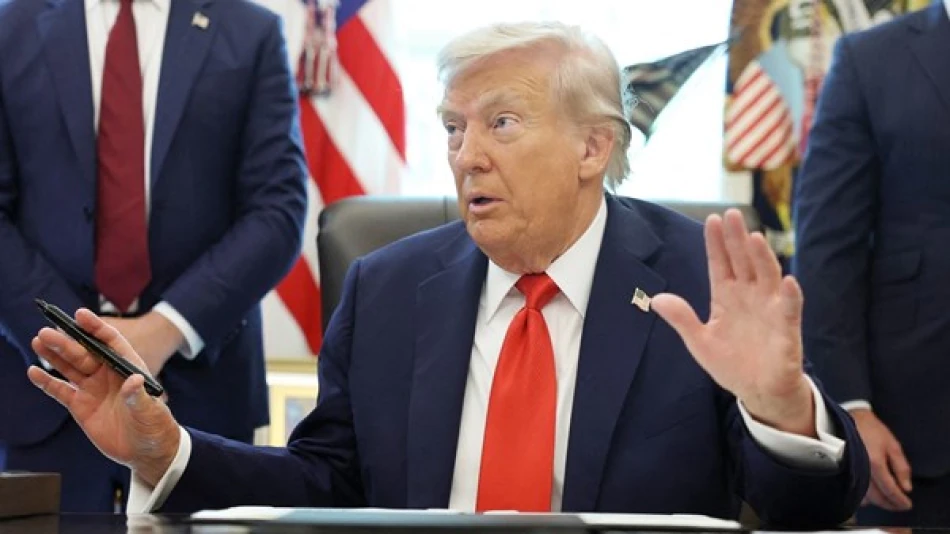
Trump Affirms Military Readiness to Respond Nationwide Amid Growing Tensions
Trump Signals Rapid Military Deployment Capability as Federal Crime Crackdown Expands to Major Cities
President Donald Trump confirmed Monday that U.S. military forces stand ready for swift deployment anywhere in the country to combat crime, signaling an escalation of his administration's federal law enforcement strategy. The statement comes as the Pentagon reportedly prepares detailed plans to deploy National Guard troops to Chicago, following similar actions already taken in Washington D.C.
24-Hour Deployment Promise Raises Stakes
When asked directly whether the Pentagon was preparing to send military personnel to Chicago, Trump responded with characteristic boldness: "We can go anywhere in less than 24 hours." This declaration represents a significant expansion of federal intervention capabilities, moving beyond traditional law enforcement boundaries into military-backed operations.
The president had previously announced that New York City and Chicago would be the next targets in his federal campaign, which has already seen National Guard deployment in the nation's capital. This systematic approach suggests a coordinated strategy rather than ad-hoc responses to individual incidents.
Chicago in the Crosshairs: Pentagon Plans Emerge
According to reporting by The Washington Post, citing unnamed defense officials, the Pentagon has been developing National Guard deployment plans for Chicago for several weeks. The nation's third-largest city has become a focal point of the administration's dual campaign against crime and irregular immigration.
The military planning reportedly includes multiple operational options, with potential implementation as early as September. The Pentagon's refusal to comment on these reports follows standard protocol for sensitive operational planning, but also suggests the seriousness of the preparations.
Historical Context and Constitutional Questions
Federal military deployment for domestic law enforcement raises complex constitutional issues under the Posse Comitatus Act, which generally prohibits the use of military forces for civilian law enforcement. However, the National Guard operates under different legal frameworks when activated by federal authorities, particularly during declared emergencies or specific circumstances.
This approach echoes historical precedents from the civil rights era, when federal forces were deployed to enforce integration, and more recent instances during natural disasters and civil unrest. However, the proactive nature of these deployments for general crime fighting represents a potentially unprecedented use of military resources.
Political and Operational Implications
State vs. Federal Authority
The expansion of federal military involvement in local law enforcement creates tension with traditional state and municipal authority over policing. Chicago and New York both have substantial police forces and existing federal law enforcement partnerships, making the military component a significant escalation.
Local officials in targeted cities may face difficult choices between accepting federal military assistance or resisting what they might view as federal overreach. The political dynamics could vary significantly between different municipal administrations and their relationships with the federal government.
Resource Allocation and Effectiveness
From an operational standpoint, deploying National Guard units for urban law enforcement requires substantial coordination, training, and resources. Unlike traditional military operations, urban policing demands different skill sets and rules of engagement, potentially creating challenges for military personnel more accustomed to conventional security missions.
The effectiveness of such deployments will likely depend on clear mission parameters, adequate training for urban environments, and coordination with existing law enforcement agencies. Previous military deployments for civil unrest have shown mixed results, with success often hinging on precise mission definition and community relations.
Broader Strategic Context
Trump's announcement fits within his administration's broader emphasis on federal law enforcement expansion and immigration control. By linking crime fighting with immigration enforcement, the administration creates a unified narrative that justifies expanded federal presence in major urban centers.
This strategy also serves political objectives by demonstrating decisive action on public safety issues that resonate with key voter demographics. The visibility of military deployment sends a strong signal about federal commitment to addressing urban crime, regardless of local political preferences.
The rapid deployment capability Trump emphasizes also serves as a deterrent message, suggesting that federal intervention can occur swiftly without extended negotiation or preparation periods. This immediacy could influence both criminal behavior and local government cooperation with federal initiatives.
Most Viewed News

 Layla Al Mansoori
Layla Al Mansoori






